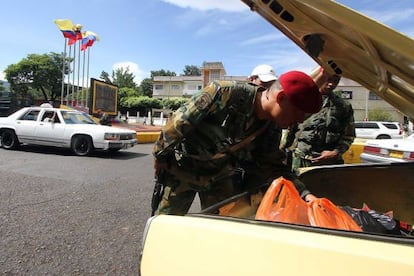Maduro embarks on anti-smuggling crusade in Venezuela
Biometric technology will be used in stores to stop purchases of goods from different locations

Venezuelan President Nicolás Maduro will try anything to maintain the country’s generous subsidies. In light of the administration’s cash-flow problem, and fearful of the social unrest that cutting subsidies could unleash, Maduro has decided to tighten controls to prevent subsidized goods from crossing the border into Colombia, where they sell at market value with a high profit margin.
On Wednesday, the president called for a mandatory broadcast on TV and radio stations to announce an all-out fight against contraband goods. He asked all Venezuelans to collaborate with the government. “I urge and invite the entire country to back all of these measures. I need your support,” he said. Several ministers and his new superintendent of fair prices, Andrés Eloy Méndez, stood by his side.
Maduro also took the opportunity to reiterate the regime’s perspective. According to the administration, the opposition defends the black market and wants to eliminate the government’s price controls in order to increase the profit margins of private businesses.
Before the chavista movement, price controls were only applied to basic necessities. The Maduro administration, however, has passed the Fair Cost and Price Law and thus extended the system to oversee all commercial products. The law established fixed maximum profit margins. In 2013, this initiative led to a goods shortage, which the government has tried to alleviate by importing everything that the private sector does not produce or gave up to be expropriated by the state apparatus because of cash-flow issues. For the last 11 years, the administration has restricted currency exchange in the country.
This economic model seems to be cracking under the weight of the currency shortage. Economists say the government only has enough liquidity to pay its import bills for three months. But the Maduro administration, conscious that the subsidies are the regime’s winning argument in elections, would rather exhaust all other measures before facing economic liberalization.
I urge and invite the entire country to back all of these measures. I need your support”
Nicolás Maduro, President of Venezuela
On Wednesday, the president tried to convince the country that his fight was a just cause. During the broadcast of his speech, he cut to live footage where a state-sponsored TV crew showed the success of the anti-smuggling campaign, which the government began on August 11 when it decided to close the border at night.
Vice President Jorge Arreaza showed viewers heaps of Venezuela’s favorite basic foods while army chief Vladimir Padrino López enumerated the amounts of unused goods found.
Maduro also said he will use biometric identification technology in supermarkets and grocery stores to prevent buyers from purchasing the same basic foods from different locations within the same week. This version of the Cuban rationing system is not news. In April, the government launched a pilot rationing program throughout state-operated grocery stores around the country. But it did not get past the testing period.
Now this overwhelmed administration has decided to shoulder the cost by using one of its propaganda cards. The chavista regime is proud of its use of the most modern and secure voting system in the world. It combines biometric technology and electronic ballots. “This will be like the fingerprint machines during elections: an anti-fraud blessing,” the president said. The government has not revealed when the measure will come into effect but Méndez said that by the end of this year all Venezuelans will be asked for their fingerprints when they go to the grocery store.
The government knows there is great temptation to smuggle and sell subsidized goods on the black market in Venezuela and in Colombia. Maduro has called for an investigation to find the big fish of the smuggling business and seize their possessions. “Storehouses, locales, trucks, vehicles, everything,” he said. These declarations forewarn of other measures to come in this official crusade.
In the next few days, the president will reveal the details of the new system to control logistics and distribution of goods throughout the country.
Every one of these measures serves the chavistas’ vision of the world. For the last 15 years, the movement has been fighting to destroy the logic of supply and demand. Maduro has said that as president “he will defend Venezuelans’ right to live in peace.”
Looking at the camera, he drew one last breath and spit at “the mafias.” “Know that you are not going to beat us, not by exhaustion or through annoyance. You couldn’t and you can’t overcome our love for this nation.”
Translation: Dyane Jean François
Tu suscripción se está usando en otro dispositivo
¿Quieres añadir otro usuario a tu suscripción?
Si continúas leyendo en este dispositivo, no se podrá leer en el otro.
FlechaTu suscripción se está usando en otro dispositivo y solo puedes acceder a EL PAÍS desde un dispositivo a la vez.
Si quieres compartir tu cuenta, cambia tu suscripción a la modalidad Premium, así podrás añadir otro usuario. Cada uno accederá con su propia cuenta de email, lo que os permitirá personalizar vuestra experiencia en EL PAÍS.
En el caso de no saber quién está usando tu cuenta, te recomendamos cambiar tu contraseña aquí.
Si decides continuar compartiendo tu cuenta, este mensaje se mostrará en tu dispositivo y en el de la otra persona que está usando tu cuenta de forma indefinida, afectando a tu experiencia de lectura. Puedes consultar aquí los términos y condiciones de la suscripción digital.








































